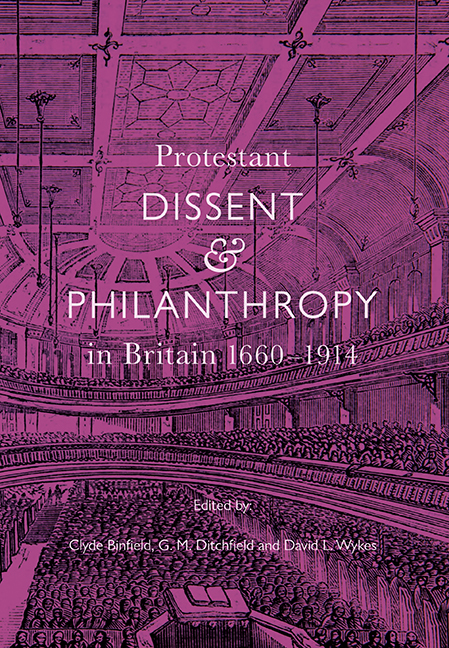Book contents
- Frontmatter
- Dedidcation
- Contents
- List of Illustrations and Tables
- List of Contributors
- Acknowledgements
- List of Abbreviations
- Introduction
- 1 Dissent and Charity, 1660–1720
- 2 Dissenters and Charity Sermons, c. 1700 to 1750
- 3 John Howard, Dissent and the Early Years of Philanthropy in Britain
- 4 Rational Philanthropy: Theory and Practice in the Emergence of British Unitarianism, c. 1750–1820
- 5 David Nasmith (1799–1839), Philanthropy Expressed as Campaigning
- 6 Building Philanthropy: The Example of Joshua Wilson (1795–1874)
- 7 Funding Faith: Early Victorian Wesleyan Philanthropy
- 8 Unitarians and Philanthropy After 1844: the Formation of a Denominational Identity
- 9 Children and Orphans: Some Nonconformist Responses to the Vulnerable in Victorian Britain
- 10 The Rowntree Family and the Evolution of Quaker Philanthropy, c. 1880 to c. 1920
- 11 ‘Not slothful in business’: Enriqueta Rylands and the John Rylands Library
- Select Bibliography
- Index
- STUDIES IN MODERN BRITISH RELIGIOUS HISTORY
3 - John Howard, Dissent and the Early Years of Philanthropy in Britain
Published online by Cambridge University Press: 21 March 2020
- Frontmatter
- Dedidcation
- Contents
- List of Illustrations and Tables
- List of Contributors
- Acknowledgements
- List of Abbreviations
- Introduction
- 1 Dissent and Charity, 1660–1720
- 2 Dissenters and Charity Sermons, c. 1700 to 1750
- 3 John Howard, Dissent and the Early Years of Philanthropy in Britain
- 4 Rational Philanthropy: Theory and Practice in the Emergence of British Unitarianism, c. 1750–1820
- 5 David Nasmith (1799–1839), Philanthropy Expressed as Campaigning
- 6 Building Philanthropy: The Example of Joshua Wilson (1795–1874)
- 7 Funding Faith: Early Victorian Wesleyan Philanthropy
- 8 Unitarians and Philanthropy After 1844: the Formation of a Denominational Identity
- 9 Children and Orphans: Some Nonconformist Responses to the Vulnerable in Victorian Britain
- 10 The Rowntree Family and the Evolution of Quaker Philanthropy, c. 1880 to c. 1920
- 11 ‘Not slothful in business’: Enriqueta Rylands and the John Rylands Library
- Select Bibliography
- Index
- STUDIES IN MODERN BRITISH RELIGIOUS HISTORY
Summary
The history of philanthropy has been written primarily as a history of gifting money or other resources with a monetary value, such as land. David Owen, for example, in his English Philanthropy 1660–1960, excluded anything in which there were not ‘substantial contributions of money from individuals and groups’. John Howard was mentioned in his book but only for information about conditions in prison. In the late eighteenth century, however, and for most of the nineteenth, John Howard was the personification of philanthropy, celebrated for qualities that had nothing to do with money. He was the first person to be consistently described as a ‘philanthropist’. What that meant in the eighteenth century, true to the Greek origin of the word, was a lover of humankind.
In this chapter I first explore the meaning and value attached to ‘philanthropy’ in the eighteenth century. I then outline the life of John Howard, contrasting his own view of himself with the veneration that others felt for him. Howard, a Congregationalist, was highly dependent on a network of Dissenters, particularly Rational Dissenters, in preparing his publications. This placed him at the heart of the English experience of the Enlightenment. These Dissenters had little time for the Romanticism that infused philanthropy. The tensions that arose are explored with reference to the proposal to erect a statue to Howard. Finally I highlight the legacy of Howard for the future of philanthropy into the nineteenth century.
Philanthropy
In the mid-eighteenth century the word ‘philanthropy’ first began to be used with any frequency. In 1755 Samuel Johnson provided a definition of it in his Dictionary of the English Language: ‘a love of mankind; good nature’. There was no mention of gifting or of doing good.
Philanthropy as it developed from the mid-eighteenth century had two central features. The first was that philanthropy was a feeling, a sentiment. From the Cambridge Platonists onwards, many argued that humans had an instinctive quality of sympathy. David Hume, sceptical about this, nevertheless accepted in mid-century that there was ‘a general benevolence in human nature’, a ‘natural philanthropy’, something that was ‘real, from general experience, without any other proof’.
- Type
- Chapter
- Information
- Publisher: Boydell & BrewerPrint publication year: 2020

